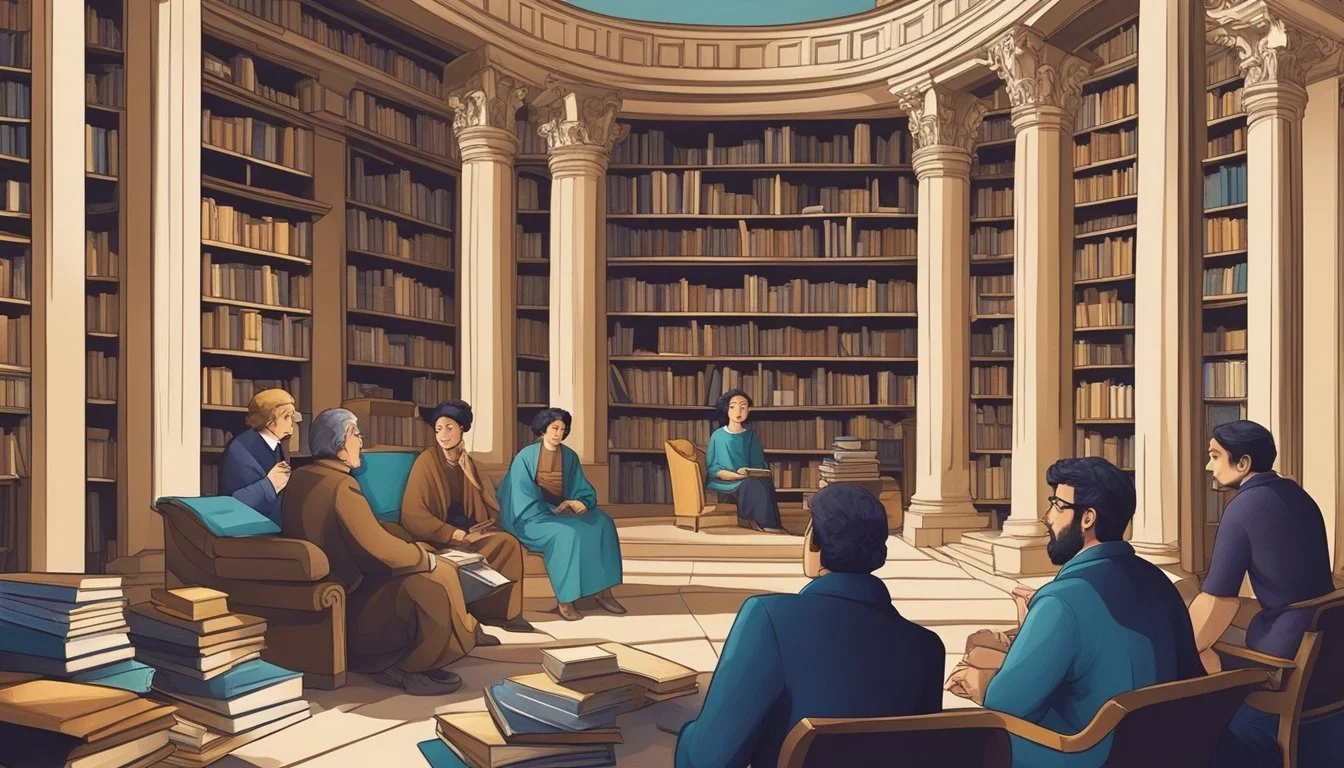8 Films on the Age of Enlightenment and its Philosophical Impact
Cinematic Explorations of Reason and Progress
The Age of Enlightenment, a period of intellectual and philosophical awakening in Europe during the 17th and 18th centuries, has captivated filmmakers and audiences alike. This era's emphasis on reason, individual liberty, and scientific inquiry has provided rich material for cinematic exploration. Films set in this period offer viewers a window into the transformative ideas and cultural shifts that shaped modern Western society.
While historical accuracy may vary, these movies often capture the spirit of the Enlightenment and its key figures. From portrayals of influential thinkers to depictions of societal change, films about this era can entertain and provoke thought. They invite audiences to consider the enduring impact of Enlightenment principles on contemporary life and the ongoing relevance of its philosophical debates.
1) "Candide" by Voltaire
"Candide" is a satirical novella written by Voltaire, a prominent figure of the Enlightenment era. Published in 1759, the work critiques the philosophical optimism prevalent during that time.
The story follows the titular character Candide as he travels the world, experiencing various misfortunes. Through these adventures, Voltaire challenges the notion of "the best of all possible worlds" proposed by Gottfried Leibniz.
The novella showcases key Enlightenment principles such as reason, skepticism, and the questioning of established institutions. Voltaire uses wit and irony to criticize religious intolerance, political corruption, and social injustice.
"Candide" has been adapted into various film versions over the years. These adaptations bring Voltaire's biting satire to life on screen, illustrating the Enlightenment's impact on modern thought.
The most notable film adaptation is Leonard Bernstein's 1989 concert version of his operetta based on the novella. This production captures the essence of Voltaire's critique while adding a musical dimension to the philosophical discourse.
2) "The Social Contract" by Jean-Jacques Rousseau
Jean-Jacques Rousseau's "The Social Contract" is a seminal work of political philosophy published in 1762. It explores the concept of legitimate political authority and the foundations of a just society.
Rousseau argues that individuals must surrender some of their natural freedoms to a collective "general will" in order to form a stable society. This social contract creates a sovereign entity that represents the common interest of all citizens.
The philosopher contends that laws should be created through direct democracy, with all citizens participating in the legislative process. He believes this approach ensures laws reflect the general will and protect individual rights.
Rousseau's ideas challenge the notion of divine right and hereditary rule, proposing instead that legitimate government derives its authority from the consent of the governed. This concept had a profound impact on democratic thought and revolutionary movements.
"The Social Contract" influenced the French Revolution and shaped modern political theory. Its emphasis on popular sovereignty and civic participation continues to resonate in contemporary discussions of democracy and citizenship.
3) "An Essay Concerning Human Understanding" by John Locke
John Locke's "An Essay Concerning Human Understanding" profoundly shaped Enlightenment thought. Published in 1689, this seminal work explored the origins and nature of human knowledge.
Locke challenged the prevailing notion of innate ideas. He argued that the human mind begins as a "blank slate" or tabula rasa, filled later through experience and sensation.
The essay presented an empirical theory of knowledge, emphasizing the role of observation and reason in understanding the world. This approach became a cornerstone of British empiricism.
Locke's work had far-reaching impacts on philosophy, psychology, and political theory. It influenced thinkers like David Hume and Immanuel Kant, shaping the course of Western philosophy.
The essay's exploration of personal identity and consciousness contributed to emerging discussions on human rights and individual liberty. These ideas resonated with Enlightenment values of reason and individual autonomy.
Locke's emphasis on experience and empirical evidence as the basis for knowledge aligned with the scientific revolution of his time. This perspective encouraged a more systematic approach to understanding the natural world.
4) "Critique of Pure Reason" by Immanuel Kant
Immanuel Kant's "Critique of Pure Reason" stands as a monumental work in modern philosophy. Published in 1781, this treatise attempts to bridge the gap between empiricism and rationalism.
Kant argues that our understanding of the world is shaped by how we perceive and think about it. He introduces the concept of the "synthetic a priori," which combines empirical observations with innate knowledge.
The philosopher explores the limits of human reason and knowledge. He proposes that while we can understand phenomena (things as they appear), we cannot truly know noumena (things as they actually are).
Kant's work revolutionized epistemology by suggesting that the mind actively structures our experiences. This idea challenged prevailing notions of passive perception and paved the way for new philosophical inquiries.
The "Critique of Pure Reason" influenced many subsequent thinkers and movements. Its impact extends beyond philosophy into fields such as psychology, ethics, and even physics.
Despite its complexity, Kant's masterpiece remains a cornerstone of Western philosophy. It continues to provoke debate and inspire new interpretations among scholars and students alike.
5) "The Spirit of the Laws" by Montesquieu
"The Spirit of the Laws" is a seminal work by French philosopher Montesquieu, published in 1748. This influential treatise examines the nature of government and law, proposing a system of checks and balances to prevent abuse of power.
Montesquieu's book compares different forms of government, including monarchy, republicanism, and despotism. He argues that laws should be adapted to the specific character and circumstances of each nation.
The work introduces the concept of separation of powers, dividing government into legislative, executive, and judicial branches. This idea greatly influenced the framers of the United States Constitution.
Montesquieu's analysis of political systems draws on historical examples and contemporary observations. He explores how factors like climate, geography, and culture shape a society's laws and institutions.
"The Spirit of the Laws" contributed significantly to Enlightenment political thought. It challenged absolutism and promoted ideas of individual liberty and constitutional government.
The book's impact extended beyond political theory. It influenced fields such as sociology, anthropology, and comparative law, contributing to a more systematic study of social and political phenomena.
6) "A Treatise of Human Nature" by David Hume
David Hume's "A Treatise of Human Nature" stands as a pivotal work in the Age of Enlightenment. Published in 1739-40, this philosophical text challenged prevailing notions about human knowledge and behavior.
Hume argued that human understanding is fundamentally based on direct experience and observation. This empiricist approach marked a significant departure from rationalist thinking of the time.
The Treatise explores the nature of human emotions and their role in decision-making. Hume posited that human actions are primarily driven by passions rather than reason.
Hume's work also delved into skepticism, questioning the certainty of knowledge and the limits of human understanding. This skeptical stance influenced later philosophers and thinkers.
Initially, the Treatise did not receive widespread acclaim. However, it gradually gained recognition as a fundamental text of the Enlightenment period.
The book's impact extends beyond philosophy. Its ideas on human nature and cognition have influenced fields such as psychology and cognitive science.
Hume's Treatise continues to be studied and debated in academic circles. Its exploration of human nature and knowledge remains relevant in contemporary philosophical discussions.
7) "The Wealth of Nations" by Adam Smith
"The Wealth of Nations" stands as Adam Smith's seminal work on economics, published in 1776. This influential text laid the foundation for modern economic thought and capitalist theory.
Smith's book explores the mechanisms of free markets and how they contribute to national prosperity. He introduces key concepts such as the division of labor and the "invisible hand" of the market.
The text argues for limited government intervention in economic affairs, promoting the idea that individual self-interest can lead to collective benefits. Smith's work significantly influenced economic policies and political philosophies worldwide.
In "The Wealth of Nations," Smith also examines topics like taxation, international trade, and the role of money in society. His insights continue to shape economic discussions and policy-making to this day.
The book's impact extends beyond economics, touching on social and political aspects of national development. It remains a cornerstone of liberal economic theory and a subject of study in various academic fields.
8) "Discourse on the Method" by René Descartes
René Descartes' "Discourse on the Method" is a seminal philosophical work from 1637. The text outlines Descartes' approach to rational inquiry and scientific investigation.
In this treatise, Descartes presents his famous method of systematic doubt. He advocates questioning all previously held beliefs to arrive at certain, indubitable knowledge.
The work introduces Descartes' famous proposition "I think, therefore I am" (Cogito, ergo sum). This became a foundational principle in Western philosophy.
Descartes divides the discourse into six parts, covering topics such as the sciences, rules of logic, morality, and the existence of God. He emphasizes the importance of reason and skepticism in the pursuit of truth.
The text promotes a mechanistic view of the natural world, influencing the development of modern scientific thinking. It challenges traditional scholastic philosophy and encourages individual critical thinking.
"Discourse on the Method" played a crucial role in shaping Enlightenment thought. Its emphasis on rationalism and methodical inquiry had a lasting impact on philosophy and science.
Understanding the Age of Enlightenment
The Age of Enlightenment marked a transformative period in Western intellectual history. It emphasized reason, individualism, and skepticism of traditional institutions and ways of thinking.
Historical Context
The Enlightenment emerged in Europe during the late 17th and 18th centuries. It followed the Scientific Revolution and the Renaissance, building on their emphasis on empirical observation and human potential.
Key events that shaped this era include:
The English Civil War (1642-1651)
The Glorious Revolution (1688)
The American Revolution (1765-1783)
The French Revolution (1789-1799)
These political upheavals reflected and fueled Enlightenment ideals of liberty, equality, and representative government.
Key Philosophies
Enlightenment thinkers championed reason as the primary source of authority and legitimacy. They questioned traditional institutions, customs, and morals.
Central philosophical concepts included:
Rationalism: Belief in reason as the main source of knowledge
Empiricism: Knowledge derived from sensory experience
Secularism: Separation of religion from civic affairs
Natural rights: Inherent, universal rights of all humans
Influential philosophers of this period:
John Locke
Voltaire
Jean-Jacques Rousseau
Immanuel Kant
These thinkers laid the groundwork for modern democracy, scientific inquiry, and human rights.
Philosophical Impact on Society
The Age of Enlightenment sparked profound changes in political thought and scientific understanding. These shifts reshaped societal structures and paved the way for modern governance and research methodologies.
Influence on Political Thought
Enlightenment philosophy challenged traditional power structures and advocated for individual rights. John Locke's concepts of natural rights and social contract theory gained traction, influencing democratic ideals.
Montesquieu's separation of powers doctrine became a cornerstone of modern constitutional governments. This principle aimed to prevent the concentration of authority in a single entity.
Rousseau's ideas on popular sovereignty and the general will contributed to the development of participatory democracy. His work emphasized the importance of citizens' active involvement in governance.
These political theories played crucial roles in major historical events, including the American and French Revolutions. They laid the groundwork for constitutional democracies and the protection of individual liberties.
Advancements in Science
The Enlightenment's emphasis on reason and empirical evidence revolutionized scientific inquiry. Francis Bacon's scientific method promoted systematic observation and experimentation.
Isaac Newton's laws of motion and universal gravitation exemplified the power of rational investigation. His work demonstrated the universe's mathematical predictability.
The scientific revolution encouraged skepticism towards traditional beliefs and superstitions. This shift in thinking led to rapid advancements in various fields, including physics, chemistry, and biology.
Enlightenment thinkers like Voltaire and Diderot popularized scientific knowledge through their writings. The Encyclopédie project, led by Diderot, aimed to compile and disseminate human knowledge systematically.
These scientific advancements laid the foundation for the Industrial Revolution and subsequent technological progress. They fostered a culture of innovation and critical thinking that continues to shape modern scientific research.




